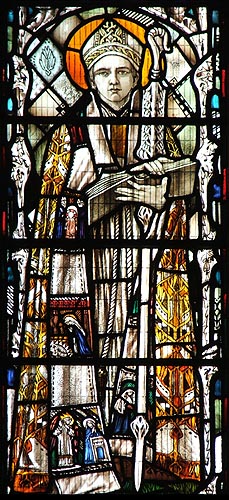 |
 |
|||
|
|
St. Swithun had been Prior of the
monastery attached to the cathedral, before he was made Bishop of
Winchester in AD 852. He was, say the chroniclers, a diligent builder of
churches in places where there were none before and a repairer of those
that had been destroyed or ruined. He also built a bridge on the east side
of the city and, during the work he made a practice of sitting there to
watch the workmen, that his presence might stimulate their industry. One
of his most edifying miracles is said to have been performed at this
bridge where he restored an old woman's basket of eggs, which the workmen
had maliciously broken. It is more certain that Swithun was one of the
most learned men of his time and the tutor, successively, of King
Aethelwulf of Wessex and of his son, the illustrious Alfred. He died on
2nd July AD 862 and was buried, according to his own desire, in the
churchyard of the Old Minster (Cathedral) at Winchester, where
"passers by might tread on his grave and where the rain from the
eaves might fall on it." His reputation as a weather saint is said to
have arisen from the translation of his body from this lowly grave to its
golden shrine within the Cathedral, having been delayed by incessant rain.
Hence the weather on the festival of his translation (15th July)
indicated, according to the old rhyme, what it would be for the next forty
days:
|
|||
| © Nash Ford Publishing 2001. All Rights Reserved. | ||||





 St.
Swithun,
St.
Swithun,